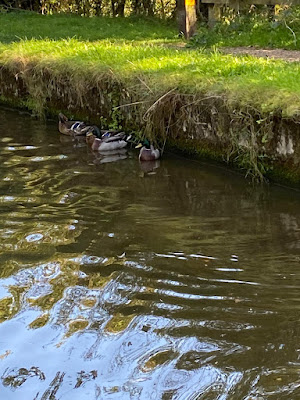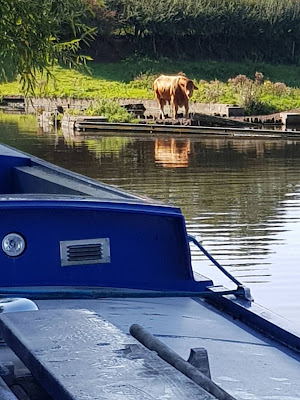Sunday 13th
September 2020
We were woken a bit
early for a Sunday, by the people arriving in the museum ready for the day.
It’s a “living museum” with a very large area full of houses and buildings
representing the industries of the Black Country a century or more ago. There
are a lot of people dressed in period costume playing the parts of the various
workers and members of the public of the time. The pool where we were moored is
just “behind the scenes”, not part of the historical area, and there was a
small gate where the actors popped out for a short break, often with a
cigarette.
In the end we got
under way at about half ten, and headed back to the Main Line. Soon after we
left there was a small drama on the towpath – an old women collapsed, and I
asked if they needed help. Her companion (daughter as it turned out) said yes,
but as I was manoeuvring to land other people on foot came along and started to
help. The women had two dogs with them, and ours were going wild, and in the
end we were causing more distraction than any help we could offer, so we moved
on.
We rejoined the main
canal at the top of the Tipton locks, and turned left, west, towards
Wolverhampton. Compared with yesterday the canal is more curving, this is a
Brindley canal now, but it has been improved by Telford in places. Most notable
is the Coseley Tunnel, which we went through quite soon. This is 360 yards
long, but it is very unlike the tunnels we are used to close to home. It is
easily wide enough for two boats to pass, with wide paths for pedestrians on
both sides in addition, and the roof is very high as well, more like a very
long bridge than a tunnel.
The water continued
to be very clear, though as we travelled it slowly returned to the muddy
opacity we are used to elsewhere. By the time we were most of the way down the
Wolverhampton flight it was back to normal. While it was clear we saw hundreds
of small fish, which we guessed were roach, something confirmed by some
fishermen we passed. At one point as I was looking down at them there was a
sudden rush and a dark shape shot out of the depths – a pike, trying to catch one
unawares.
At Deepfields
Junction we passed the end of a short (2 mile) dead end branch – originally
this formed a twisting loop which would have joined the main line further back
along our route. About three winding miles further on we came to another
junction, at Horsley Field – this one heads out into the complicated network
north of the main line; we have passed other connections to that in the last
couple of days.
Just round the corner
we came to a small pool and the top lock in the Wolverhampton flight, 21 locks
which would be the main meal of the day. We were very close to the centre of
Wolverhampton at this point, just outside the inner ring road, but it did not
seem that way. It is not a high-rise city, and there was a fair amount of
greenery around the canal, so we were unaware of the amount of built-up area
around us.
 |
| Wolverhampton Flight |
The 21 locks are well
maintained and very consistent, so it was possible to get into a nice rhythm.
We passed another boat coming up the top lock as we started down, and the guy
working the gates made a remark to me about stepping across “or don’t you do
that?”. I didn’t immediately twig, but a bit of thought and it made sense.
Going down, as your boat leaves the lock you will need to close both gates.
There’s no bridge at the bottom end, so one method would be to close one gate,
then walk all the way up the lock, cross over and then back down to close the
second gate. A faster way is to close one gate then walk out along it and step
across the gap to the other gate, then close it and off you go – saving two
walks along the length of the lock. The gap is only about three feet, so
perfectly safe as long as you don’t worry about the drop into the water below.
I worked out the optimum sequence, which included dropping the paddles and
using the boat roof as a bridge as she leaves, and then stepping back across
the gap once the lock is empty. Loulie refused to look back to see me stepping
over the gap, but it is perfectly safe.
As I said the locks
themselves were in good condition and easy to work, especially going down, when
the undertow is always less so keeping the boat steady is easier for Loulie. We
passed a few people going the other way as well, particularly early on, each
one making things a little easier for one lock at least. Although we were still very much in Wolverhampton we didn’t see much of it, one lock had a factory
overlooking it but for the most part trees blocked our view of any housing and
it was all very pleasant. There was just one pound where the water was rather
low. We had been warned by people going the other way and Loulie had to feel
her way very carefully along, getting stuck a couple of times but getting
through OK.
At the bottom of the
flight at Aldersley Junction the exit from the last lock is straight out onto
the Staffs & Worcs Canal – the lock landing is just round the corner. We
turned right up the canal northwards, but we only had to go half a mile before
we came to Autherley Junction, and the mouth of the Shropshire Union on the
left. We had to wait a while as a boat was coming out, and the stop lock here
had become rather difficult to work, but soon we turned in, and we were back on
waters we had travelled before, two years previously.
 |
| Autherley Junction - onto the Shroppie |
After squeezing
through the stop lock (the gates won’t open fully so it’s a tight fit getting
out) we carried on up the Shroppie for a mile or two, passing the Wolverhampton
Boat Club on the left, very neat and trim. A little further on, at Bilbrook past the
Pendeford Bridge, we stopped at some 48 hour moorings. There were rings there
but even so, this being the Shroppie, we were not surprised to find that there
was quite a ledge and we had to deploy the gangplank for the dogs. Loulie took
them off for a walk while I tidied up the moorings, finding a spot which
minimised the gap, and we settled down for a comfortable night.
 |
| Moorings (and a cow) at Bilbrook |
TODAY: 6:30 HOURS. 9.8 MILES. 22 LOCKS.
Voyage: 60:10 HOURS. 106.2 MILES. 101
LOCKS.




















